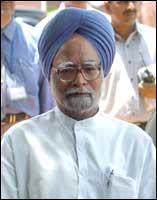 | « Back to article | Print this article |
PM pledges 'helping hand' to farmers
Prime Minister Manmohan Singh said on Thursday that the United Progressive Alliance government will create a single market for manufactured and agri-products, announce an energy policy package and pursue economic reforms to give "new deal" to rural India.
"I would like to see the creation of a single market across the country for both manufactured and agricultural produce. With the introduction of value-added taxation, this integration of the Indian market will be further enabled," Singh said in  his first broadcast to the nation after becoming the prime minister.
his first broadcast to the nation after becoming the prime minister.
Regretting that "no helping hand" has been extended to the farmers who have been in distress in many parts of the country, Singh said, in recent years, their interests have been neglected, which led to significant slowing down of agricultural growth in the past five years.
The UPA government's Common Minimum Programme was committed to giving a "new deal" to rural India. Agriculture must receive the priority attention it deserves. Public and private investment in agriculture has to be greatly increased, he said, adding there are still too many internal barriers to farm trade and that must go.
Higher rates of economic growth, urbanisation and modernisation of agriculture will continue to increase the demand for energy, Singh said, adding "We will evolve an energy policy package that will cover all sources of energy and will address all aspects like energy security, access, availability, affordability and pricing, efficiency and environment."
Observing that much of the focus of reforms in the past decade was on reducing government role in controlling the private sector, Singh said, "We will pursue economic reforms and widen space for individual initiative and enterprise."
"But even as we do so, we cannot forsake the obligation of running a government that works for the people. The reforms in administration and public institutions to improve efficiency and the quality of delivery of services would be our immediate priority," he said.
A key concern in agriculture in recent years had been the lack of access to credit, he said adding, "Our government is already addressing the issue directly, by pursuing policies that improve the farmers' access to affordable credit."
"I would like to see the emergence of new centres of excellence in agriculture as we have in technology and management. There has to be a sharper focus on expanding opportunities in gainful employment in agriculture and in off-farm rural activities," the prime minister said.
The government would also re-examine those policies that prevent creative interaction of farmers and agro-industries, he said.
Referring to rapid urbanisation, Singh said the government would give special attention to policies that could encourage urban development and renewal through active public-private partnership in building infrastructure.
Singh said there were now 30 cities with more than one million population.
"The rapid and unplanned growth of these cities has contributed to increased urban population, crime, absence of required infrastructure, making life in urban India a living hell for many," he said.
Elaborating on the "reforms with a human face", the prime minister said, "Economic reform is not only about freeing private enterprises from the shackles of bureaucratic control. It is also about making the government more effective, efficient and people-friendly so that it can handle better the many tasks that only the government can perform."
"It is also about ensuring fair and transparent regulation of the market," he said.
"While many in our country are benefiting from the integration of the market and the global economy, millions of our citizens are still plagued by illiteracy, disease, hunger and malnutrition," he added.
Pledging to remove disparities among regions and different sections of the population, Singh said, "As a nation, we cannot accept such disparities. We have an obligation to ensure that they too benefit from growth in full measure."
Stressing on globalisation, Singh said, "We will pursue policies that enable our economy to be better integrated with the world economy without hurting the interests of our people."
In this context, he said the government will create an environment conducive to utilisation of the talent pool of the vast and diverse Indian diaspora.
"We greatly value their participation in the development of our nation," he said.